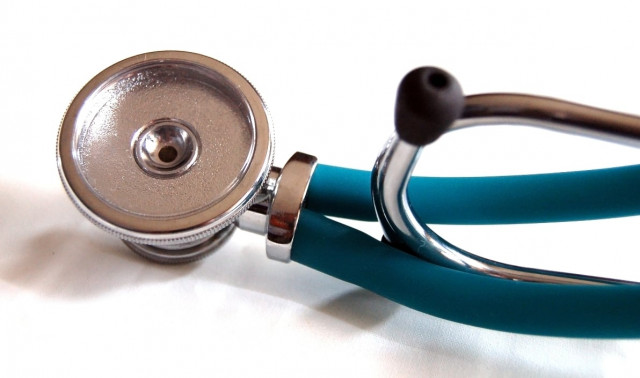Healthy, if not heated, debate as doctors and journalists face off on professional hazards
JPMC 48th annual medical symposium inaugurated.

Healthy, if not heated, debate as doctors and journalists face off on professional hazards
Blood was let at the annual Jinnah hospital symposium on Monday - not literally but it sure felt like it. And it was about time, perhaps, for doctors, and the journalists who cover them, to open a few veins. Someone needed to start a debate.
For her part, Jinnah hospital chief Professor Tasnim Ahsan felt that the media has tarnished the image of doctors in the country. She was speaking at the interactive session between health professionals and media personalities. ‘Face to Face’, moderated by Dr Seemin Jamali and featuring gynaecologist Dr Shershah Syed, the former secretary general for the Pakistan Medical Association Dr Samrina Hashmi and the dean of the faculty of medicine at the College of Physicians and Surgeons of Pakistan Professor Liaquat Ali. On the other side was the director of news for ARY Mazhar Abbas, Huma Bokhari of Express News and part-time anchor Faisal Qureshi.
A clip was shown from a morning show in which the JPMC administration was degraded over the alleged rape of one of their nursing students. Dr Samrina Hashmi said that more often than not, doctors were not contacted for their version of the story and health journalists would simply run one-sided news. In response, there were complaints that doctors, especially ones at key administrative posts, were inaccessible. When there is a bomb blast, for example, the media hounds a hospital spokesperson for official comment. But on the flip side, surely hospitals must appoint someone who can deal with the media when a major event happens and relatives want to know about the victims.
There was the usual discussion on the “distasteful” trend of visuals full of blood and gore, how some anchors believe they are “untouchable” and blow issues out of proportion, playing judge and jury with doctors. Also discussed were cases of medical negligence which Dr Shershah said were not deliberate and should not be projected as such by the media.
Responding to the list of allegations, Mazhar Abbas began with his efforts to investigate the death of an ARY cameraman. “Our cameraman was recently stabbed and ... was operated upon,” he began. The operation ended with a surgical tool being left in the cameraman’s body due to which he was paralysed and died soon after. “You’re right,” he told the doctors, “We aren’t investigating the medical field as we should because if we did, huge scams would be unravelled and prominent doctors would be exposed.” For his part, Qureshi pushed the doctors to be more economically aggressive, saying they could better serve society if they first resolved their financial woes.
Here on, the discussion turned into a debate which at several points seemed to heat near boiling point. Since the session was held at a hospital, nearly the entire audience support lay with the health defenders. Among other things, they accused the media of “unnecessarily spreading panic”, “scandalising news of medical negligence”, “not attempting to understand the doctor’s plight in sensitive situations”.
Abbas countered as best as the crowd permitted him to with constant interruptions. In response to the talk shows targeting doctors and not checking the facts, he said that sensationalising the news and screaming matches on air were endorsed by viewers which is why they were still around. “If we stopped watching this slanderous behaviour on TV, its ratings would drop and [these shows] would be automatically taken off air,” he told the restless audience.
Present in the audience was gynaecologist Dr Azra Ahsan, who attempted to balance the blame game. Hospitals were not hotels and there is no medicine without side effects and no surgery without risk, so matters should not be blown out of proportion.
Plenary session
The immediate need for a revision of the medical education system and the importance of assessing curricula needs was emphasised by PMA Karachi president Dr Idrees Adhi. He focused on the lack of training, critical thinking, analytical skills and application of knowledge due to this. As a result, he said, an environment of intolerance, frustration and depression was germinating. On kickbacks from pharmaceutical companies, he stressed that medical professionals needed to show integrity and not be on the lookout for freebies.
“We give a great deal of importance to numbers,” pointed out journalist Ghazi Salahuddin. “We may be the sixth largest country in the world and one of the seven proclaimed nuclear powers with the fifth, sixth or seventh largest standing army but what about our human development index,” he asked. “Why don’t we take a closer look at our literacy rate or those who have access to clean drinking water?”
The chief guest, federal secretary for health, Nargis Sethi, was unable to attend because of a cabinet meeting.
Published in The Express Tribune, March 29th, 2011.



















COMMENTS
Comments are moderated and generally will be posted if they are on-topic and not abusive.
For more information, please see our Comments FAQ